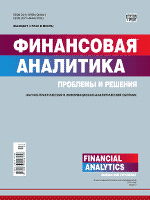Abstracting and IndexingРИНЦReferativny Zhurnal VINITI RAS Worldcat Google Scholar Online availableEastvieweLIBRARY.RU Biblioclub |
Tax benefits of profit tax of organizations: current questions of optimization
Available online: 16 August 2014 Subject Heading: EFFECTIVENESS OF ECONOMIC POLICY JEL Classification: Pages: 37-46
The article points out that tax incentivisation is an effective tool of influence of the State on business, investment, innovation, labor force activity, development of science, technology and the social sphere. The more pressing issue is to perform the purpose of benefits and to provide these benefits to those who really need them. Assessing the legislation on taxes and levies of the Russian Federation, one may assert that the system of tax privileges and preferences is only partly conforming to the specified requirements. The paper states that there is a need to develop a methodology for assessing tax privileges (preferences) containing a single criteria for their effectiveness. Currently, there are many methods to achieve reasonable levels of tax payments. In practice, the minimum payments are not always optimal. Taxation of profit of organizations is closely monitored by the State. The techniques and instruments to promote investment activities, as well as the creation of an effective and modern system of taxation for innovative enterprises offer attractive opportunities. On the basis of the analysis of the existing tax breaks on income tax of organizations, the article analyzes the reasons for their poor performance and provides recommendations to solve a problem. The authors arrive at conclusions on the necessity of tax benefits optimization. The authors emphasize that one of the important directions of optimization of tax benefits is the development of effective monitoring. The paper considers that currently, in Russia, the monitoring activities in the field of tax benefits are often limited to the control of tax revenues, which are executed by the tax authorities in collaboration with the Treasury authorities, and, as a rule, are confined to the accounting of budget tax revenues. The article makes proposals on the organization of the monitoring of the tax benefits. Keywords: tax, regulation, optimization, organizations, profit tax, effect, monitoring, benefits, innovation, investment References:
|
ISSN 2311-8768 (Online)
|
|








